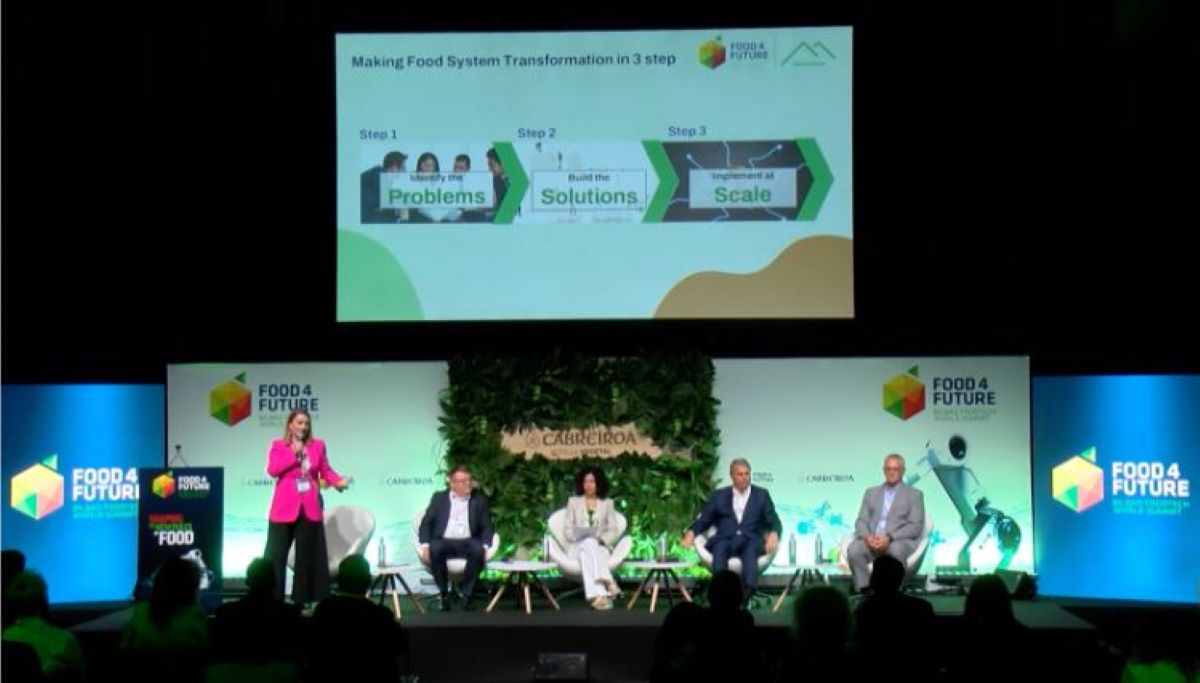Christina Senn-Jakobsen: An ecosystem-led approach to food system transformation

Christina Senn-Jakobsen, the Valley’s Managing Director, offers up some food for thought on how a collective, ecosystem-led approach can accelerate food system transformation.
A few weeks ago, I was staring at a blank page. While preparing to attend a panel on “Making Food Production Part of the Climate Change Solution” at the annual Food 4 Future conference, I was struggling to decide which technology to focus on. So I zoomed out to get clarity. And that’s when I decided to focus on the “how” rather than the “what”.
When we talk about the role of food systems in climate change mitigation, discussions often quickly focus on who in the food value chain is responsible. But ultimately, we human beings got ourselves into this mess. Now it’s up to us all to find a way out.
For me, this is about transitioning to an ecosystem-led approach. It’s about combining our strengths and acknowledging how working together increases our impact. This ultimately comes down to three key steps.

1. Identify the problems
The challenges facing our food system are well-established. We know that at least 30% of the world’s emissions are linked to the food we produce. We know that there are 828 million undernourished people without access to safe and nutritious food, while a further 2.3 billion people are overweight and suffering from chronic conditions such as Type 2 diabetes and cardiovascular disease. And both numbers are increasing dramatically. As our population continues to grow, we know we need to find new ways to produce more with less and cut down on waste along the way.
Our colleagues in academia and research are doing an amazing job in identifying the problems that lie within our food systems and analysing and quantifying the impacts of these problems. This gives us a great starting point for informed and targeted action.
2. Build the solutions
Once the problems are identified, the next step towards transformation is building solutions. Smart, purpose-driven and courageous startups, SMEs, corporates and technology and innovation centers take on the challenge of transforming problems into opportunities. Their creative solutions need to address the initial issue while also working within the complexity of the interconnected global food systems.
“We have the technology to transform our food systems from being a part of the problem to being a part of the solution.”
For every problem identified, a garden of entrepreneurial seeds are planted. Our innovation ecosystems – supported by investors and innovation enablers – provide the water and nutrients that allows an idea to grow. For example, as climate studies reveal the impact of plastic in our oceans, innovators use their expertise and technology to transform algae or xylose from plants into bio-based and sustainable packaging alternatives to plastic.
We have the technology to transform our food systems from being a part of the problem to being a part of the solution.
3. Implement the solutions at scale
Steps one and two lay the groundwork. Now we get to the part that truly drives change: implementing solutions at scale. But this is where we’re struggling.
“We all love engaging with the latest innovation. But implementation and scaling is 95% of the work towards impact.”
Globally, we’ve done amazing work on steps one and two. We all love engaging with the latest innovation, but implementation and scaling is 95% of the work towards impact – both in terms of effort and even more so from an investment perspective. This is the only way we will move the needle, and it’s where we all need to shift our focus right now.
But why does this matter? The Intergovernmental Panel on Climate Change stated in their sixth assessment report earlier this year that there is a rapidly closing window of opportunity to secure a liveable and sustainable future for all. And the Sustainable Development Report 2023 recently revealed, we’re now halfway to the finish line for Sustainable Development Goals but we’re definitely not on track.
Switzerland as a scale-up nation
So what can we do? Switzerland may be a small, landlocked country nestled at the heart of Europe, but we’re a big food nation. We believe that our ability to support food businesses to scale is a key part of what we can offer on the global stage.
Swiss Food & Nutrition Valley brings together over 130 Swiss ecosystem actors from across the food value chain around the premise that we can go further and faster together. Yes, we’re all a part of the problem. But together we can also be part of the solution.
“Scaling is how we make the transformation happen.”
In a natural ecosystem, plants, animals, and other organisms, as well as weather and landscape, work together to form a symbiosis of life. An innovation ecosystem should work in the same way. Each actor has something unique to offer and becomes the lifeblood of a thriving food nation.
There are many key players in our ecosystem. Academia and research provide the technologies, knowledge and talent that sows the seed of a new idea. A startup or an SME develops innovative technologies or a new type of product or service. Then they team up with an accelerator or a government-supported programme to find the right partners. They secure investment to access the capital they need to scale. And they collaborate with a multinational company that can offer them the reach they need to access new markets and work to secure citizen’s acceptance through retail and collaborations with the food service sector.
The key here is collaboration. Step three requires everyone to work together by contributing their specialised expertise to the system. This is our only chance to get to the sustainable food future we all imagine – in time.
So I’d like to leave you with a request. Sit down with a pen and paper and think about what you can do in your role – both as a professional and as a human – to help scale up the impact of the most promising solutions. Then hang up this note on your fridge or in your office so you don’t forget the power of your potential contribution. Or even better: send it to me. I’d love to hear your thoughts.
Connect with Christina on LinkedIn.
Never miss a Swiss food innovation morsel.
Latest News
Bühler Scale-Up Day accelerates industry and start-up collaboration
Valley partner Bühler is making...
What if talent – not tech – is the missing ingredient in building food system resilience?
What if talent – not tech – is the...
Bühler Networking Days 2025: Scaling sustainable food solutions through collaboration
More than 1,200 industry leaders from...
Discover Switzerland’s food innovation ecosystem with the SFNV Navigator
Eager to embark on a journey in the...




